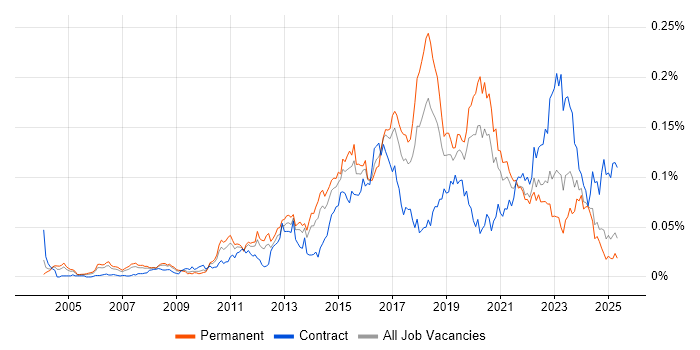Distributed Denial-of-Service (DDoS)
UK > UK excluding London
The table below looks at the prevalence of the term Distributed Denial-of-Service in permanent job vacancies in the UK excluding London. Included is a benchmarking guide to the salaries offered in vacancies that cited Distributed Denial-of-Service over the 6 months leading up to 6 January 2026, comparing them to the same period in the previous two years.
| 6 months to 6 Jan 2026 |
Same period 2025 | Same period 2024 | |
|---|---|---|---|
| Rank | - | 553 | 524 |
| Rank change year-on-year | - | -29 | +190 |
| Permanent jobs citing Distributed Denial-of-Service | 0 | 10 | 25 |
| As % of all permanent jobs in the UK excluding London | - | 0.027% | 0.077% |
| As % of the Miscellaneous category | - | 0.080% | 0.22% |
| Number of salaries quoted | 0 | 1 | 23 |
| 10th Percentile | - | - | £46,600 |
| 25th Percentile | - | £47,500 | £51,250 |
| Median annual salary (50th Percentile) | - | £50,000 | £52,500 |
| Median % change year-on-year | - | -4.76% | -4.55% |
| 75th Percentile | - | £52,500 | £65,603 |
| 90th Percentile | - | - | £74,000 |
| UK median annual salary | £135,000 | £65,000 | £55,000 |
| % change year-on-year | +107.69% | +18.18% | -8.33% |
All Generic Skills
UK excluding London
Distributed Denial-of-Service falls under the General and Transferable Skills category. For comparison with the information above, the following table provides summary statistics for all permanent job vacancies requiring generic IT skills in the UK excluding London.
| Permanent vacancies with a requirement for generic IT skills | 13,692 | 12,468 | 11,358 |
| As % of all permanent jobs advertised in the UK excluding London | 32.53% | 34.13% | 35.14% |
| Number of salaries quoted | 6,314 | 5,420 | 8,068 |
| 10th Percentile | £26,375 | £30,000 | £29,510 |
| 25th Percentile | £31,500 | £41,250 | £38,852 |
| Median annual salary (50th Percentile) | £47,500 | £54,000 | £54,500 |
| Median % change year-on-year | -12.04% | -0.92% | -0.91% |
| 75th Percentile | £65,000 | £68,152 | £67,500 |
| 90th Percentile | £78,750 | £82,500 | £83,750 |
| UK median annual salary | £55,000 | £60,000 | £60,000 |
| % change year-on-year | -8.33% | - | -7.69% |
Distributed Denial-of-Service
Job Vacancy Trend in the UK excluding London
Historical trend showing the proportion of permanent IT job postings citing Distributed Denial-of-Service relative to all permanent IT jobs advertised in the UK excluding London.

Distributed Denial-of-Service
Salary Trend in the UK excluding London
Salary distribution trend for jobs in the UK excluding London citing Distributed Denial-of-Service.

